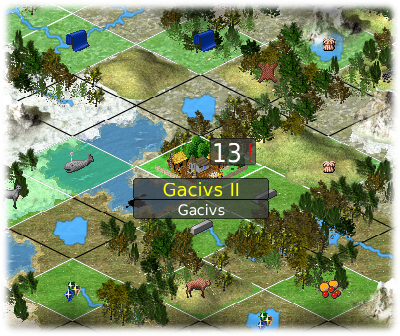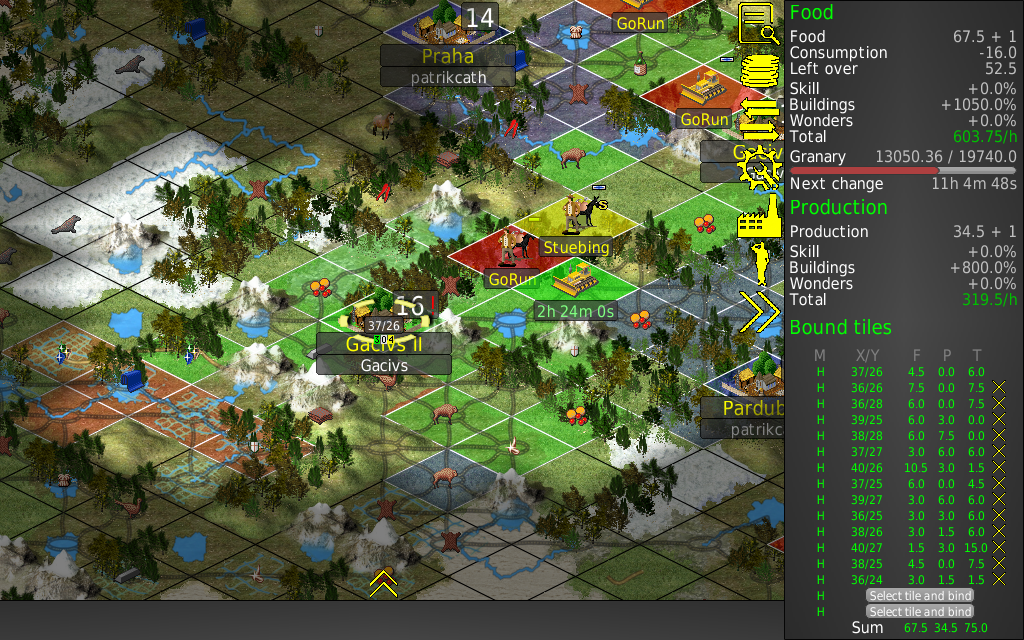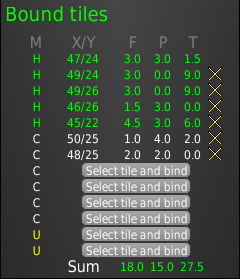5. Cities
Cities
A city is created when settlers are given the build city command on suitable terrain (any terrain except sea or ocean), removing the settlers unit from play to provide the city with its first citizen. A city may grow to include dozens of citizens. Famine and war kill citizens and reduce population; with the loss of its last citizen a city disappears. On the map each city is labeled with its population, also called its size.
Cities are your sole instrument for developing natural resources and channeling them toward expansion, technological progress, and warfare. After describing how city citizens extract natural resources, we will examine how cities themselves may be developed and cultivated to increase their value and productivity.

Cities on the map
Working land
Each city may work terrain within the region centered on the city, the diameter of the region is depends on the size of the city. To extract resources from a square you must have a citizen working there. The example city shown on the above has 14 of its 16 citizens working in nearby squares; each active square is labelled with green background. By taking one or more of these squares out of production, the player could choose other squares for his citizens to work.

City overview and details
Note that the square on which the city itself rests - the city center - gets worked for free, without being assigned a citizen. The city's square always produces at least one food point and at least one production point. It also gains whatever advantages the terrain offers when irrigated; for that, workers must explicitly irrigate the square. City squares are also automatically developed with roads or, when technology has made them available, railroads (because cities come with transportation built-in).
You cannot begin working a square which a neighboring city is already working, nor can you work terrain upon which an enemy unit is standing or terrain is already worked by another player's city. Thus you can simulate conditions of siege by stationing your units atop valuable resources around an enemy city. Units can also be ordered to pillage, which damages improvements. Workers, settlers and engineers could even transform the terrain to make the square less productive, like the Romans sowing the fields of Carthage with salt.
Buildings and wonders
Cities may be enhanced with a wide variety of buildings, each with a different effect; each city may have only one of each building. Buildings are listed and described later. Most buildings become available only when you achieve certain technologies, while technology makes others become obsolete.
It costs production points to construct buildings — often taking several hours — and, once completed, many buildings require an upkeep of several gold pieces. You may dismantle and sell a building, receiving one gold piece for each production point used in its construction. If you cannot pay the upkeep on all of your buildings, some of them will be automatically sold; obviously this should be avoided as the buildings chosen might not be ones you would have preferred to sell.
Wonders are unique structures that can each be constructed by only one civilization per game. Players often race to be the first to complete a coveted wonder. While buildings affect only their own city, many wonders benefit their entire civilization.
Civilization and its Malcontents
Unfortunately city growth produces crowding which makes it difficult to maintain worker morale. Each citizen is either happy (H), content (C), unhappy (U) or angry (A). Only the first four workers are naturally content; the rest are naturally unhappy. Most of the buildings and wonders that affect morale (all are listed in the right section) merely make unhappy workers content.

Bound tiles of the city
Workers are made happy when you provide them with luxury. For every five luxury points a city produces, one content worker is made happy (or if there are no content workers left, one unhappy worker becomes content).
Military units can affect city happiness. Under authoritarian regimes this is helpful, as military units stationed in a city can prevent unhappiness by enforcing order. Under representative governments the only effect is negative — citizens become unhappy when their city is supporting military units which have been deployed into an aggressive stance. This includes units not inside your borders, a friendly city (including the cities of your allies), or a fortress within three squares of a friendly city; however, field units (missiles, helicopters, and bombers) cause unhappiness regardless of location. See the section on governments for the number of workers affected by each of these factors.
All of the above discussion assumed that cities can grow to size four without unhappiness, with the fifth worker being the first unhappy. This limit actually decreases as you gain large numbers of cities, to simulate the difficulty of imposing order upon a large empire. Different governments can support different numbers of cities before encountering this limit for the first time; see the section on government for details.
Continued empire growth may lead to further penalty steps, with the precise details again being dependent on government. In empires that grow beyond the point where no citizens are naturally content, angry citizens will appear; these must all be made merely unhappy before any unhappy citizens can be made content, but in all other respects behave as unhappy citizens.
Pollution
Pollution can plague large cities, especially as your civilization becomes more industrialized. The chance of pollution appearing around a city depends on the sum of its population, aggravated by the advances industrialization, the automobile, mass production, and plastics, and its production point output. When this sum exceeds 20, the excess is the percent chance of pollution appearing each turn; this percentage is shown in the city dialogue.
Pollution appears as gunk covering of the terrain squares around the city. The pollution can only be cleared by dispatching workers, settlers or engineers with the clean pollution order (which takes three settler-turns to carry out). A polluted terrain square generates only half its usual food, production, and trade.
When an unused square becomes polluted, there is the temptation to avoid the effort of cleaning it; but the spread of pollution has far more terrible results — every polluted square increases the chance of global warming. Each time global warming advances, the entire world loses coastal land for jungles and swamps, and inland squares are lost to desert. This tends to devastate cities and leads to global impoverishment.
(Content is available under the GNU General Public License).

